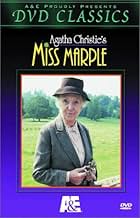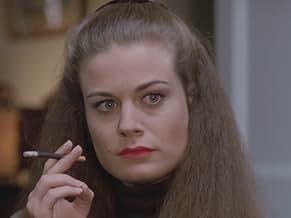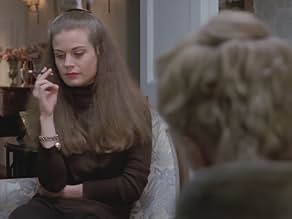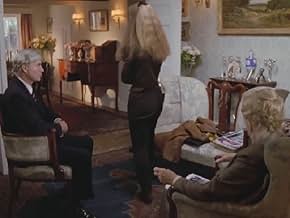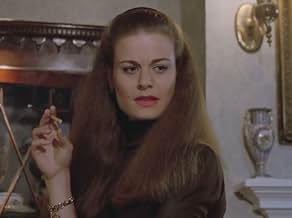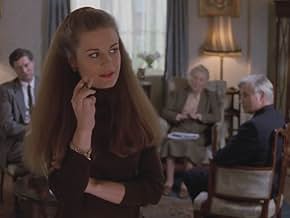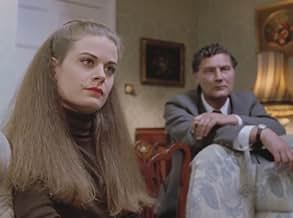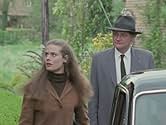Miss Marple: El espejo que se rasga de un lado a otro
Título original: Miss Marple: The Mirror Crack'd from Side to Side
PUNTUACIÓN EN IMDb
7,5/10
2,2 mil
TU PUNTUACIÓN
Añade un argumento en tu idiomaAt a reception for a fading film star making a screen comeback, a gushing, pushy fan is poisoned by a drink apparently meant for the actress.At a reception for a fading film star making a screen comeback, a gushing, pushy fan is poisoned by a drink apparently meant for the actress.At a reception for a fading film star making a screen comeback, a gushing, pushy fan is poisoned by a drink apparently meant for the actress.
- Dirección
- Guión
- Reparto principal
- Nominado a 1 premio BAFTA
- 3 nominaciones en total
Reseñas destacadas
An earlier version of this movie "The Mirror Crack'd (1980) ASIN: 6302990149" was made with a lot of glitzy characters. Some of them were quite well such as Rock Hudson (Jason Rudd). Others were distracting as they let their real personalities overwhelm the characters. One of the worst was Angela Lansbury's portrayal of Miss Jane Marple; she was much too cutesy. This film was to Americanize (black and white, judgmental.) and half the characters were combined for brevity.
Based on a novel, Christie, "Agatha. Mirror Crack'd, the", the film Miss Marple: The Mirror Crack'd from Side to Side (1992) (TV) (UK: series title) stays true to form. Joan Hickson as Miss Marple. Agatha Christie always considered her as the ideal Miss Marple; she shows this through her reserve savvy. Jane takes an interactive interest in the mystery and yet each character as part of the discovery, stands on their own. The ending of the story is as is in life, it is appropriate, not black and white judgmental.
Based on a novel, Christie, "Agatha. Mirror Crack'd, the", the film Miss Marple: The Mirror Crack'd from Side to Side (1992) (TV) (UK: series title) stays true to form. Joan Hickson as Miss Marple. Agatha Christie always considered her as the ideal Miss Marple; she shows this through her reserve savvy. Jane takes an interactive interest in the mystery and yet each character as part of the discovery, stands on their own. The ending of the story is as is in life, it is appropriate, not black and white judgmental.
Film megastar Marina Gregg is hosting a reception at her home in St Mary Mead. A fan is poisoned at the reception and it appears that the drink was meant for Ms Gregg. On the case is Detective Inspector Craddock...and, of course, Miss Jane Marple.
The final episode in the series that is the definitive Miss Marple one. Fittingly, it's a great one. An intriguing mystery, complete with a good twist.
Elevating the episode is the return of Robert Castle as Detective Inspector Craddock. Craddock was the detective in A Murder is Announced and the best detective in the series, Castle playing him with great gravitas, calmness and sense of authority. Slack (now a Superintendent) is still there, as is Sergeant Lake, so for the finale we have all the key Marple detectives in one place - a nice gesture.
The final episode in the series that is the definitive Miss Marple one. Fittingly, it's a great one. An intriguing mystery, complete with a good twist.
Elevating the episode is the return of Robert Castle as Detective Inspector Craddock. Craddock was the detective in A Murder is Announced and the best detective in the series, Castle playing him with great gravitas, calmness and sense of authority. Slack (now a Superintendent) is still there, as is Sergeant Lake, so for the finale we have all the key Marple detectives in one place - a nice gesture.
Arthur Bantry has passed away, Dolly Bantry has sold Gossington Hall to legendary film icon Marina Gregg, and moved to a small lodge on the site. Marina has moved to St Mary Mead for a quieter life, along with husband Jason Rudd and servants. Marina agrees for Gossington Hall to host its annual fête, she is introduced to the locals, one she meets in particular seems to have a profound effect on her, Heather Badcock, a woman of modest means from the new development site and St John's Ambulance volunteer. During the rather dull conversation about a meeting many years previous, Marina is frozen to the spot, a look described as being likened to The Lady of Shalott 'Doom came upon her etc.' Heather, not a drinker, takes a drink (a daiquiri) intended for Marina, not used to alcohol suddenly dies, alarm bells raised and Marina descends into a terrified state, who had intended to poison her?
Miss Marple, now in her advanced years, has a carer/companion named Miss Knight, a feisty Scotswoman who attempts to encourage Miss Marple to take it easy, but the detective in her sets out to unravel the mystery.
As a novel, I think it's one of the easiest Agatha Christie stories to read; the characters are beautifully created, and they translate well into this adaptation. Claire Bloom is particularly delightful as Marina Gregg. I firmly believe in her talent as a great actress in her later years (well, it's not exactly a stretch in reality, is it?), as she is such a beautiful, charismatic woman.
There are lots of old friends on display to bow out with, including Inspectors Craddock and Slack, Dolly Bantry, Sergeant Lake, Christopher Hawes, etc. It ends with such a sweet moment. My favorite scene has to be the village ladies discovering the marble bathrooms for the first time, which were no doubt rare at the time; their reactions are just wonderful. Miss Marple's frustrations with Miss Knight are so fun, too.
Such a shame they never adapted 'The Blue Geranium,' although I regularly enjoy the audio-book ready by Joan Hickson herself.
Some people have commented about Miss Marple suddenly being Craddock's aunt, I think it's meant more as a term of endearment, after a closeness between them developed over the years.
It's tale of tragedy and murder, with a couple of humourous subtleties thrown in. I like it very, very much, it remains superior to the Marple and the Hollywood film.
9/10.
Miss Marple, now in her advanced years, has a carer/companion named Miss Knight, a feisty Scotswoman who attempts to encourage Miss Marple to take it easy, but the detective in her sets out to unravel the mystery.
As a novel, I think it's one of the easiest Agatha Christie stories to read; the characters are beautifully created, and they translate well into this adaptation. Claire Bloom is particularly delightful as Marina Gregg. I firmly believe in her talent as a great actress in her later years (well, it's not exactly a stretch in reality, is it?), as she is such a beautiful, charismatic woman.
There are lots of old friends on display to bow out with, including Inspectors Craddock and Slack, Dolly Bantry, Sergeant Lake, Christopher Hawes, etc. It ends with such a sweet moment. My favorite scene has to be the village ladies discovering the marble bathrooms for the first time, which were no doubt rare at the time; their reactions are just wonderful. Miss Marple's frustrations with Miss Knight are so fun, too.
Such a shame they never adapted 'The Blue Geranium,' although I regularly enjoy the audio-book ready by Joan Hickson herself.
Some people have commented about Miss Marple suddenly being Craddock's aunt, I think it's meant more as a term of endearment, after a closeness between them developed over the years.
It's tale of tragedy and murder, with a couple of humourous subtleties thrown in. I like it very, very much, it remains superior to the Marple and the Hollywood film.
9/10.
So, here we are with the redoubtable Miss Marple, a lovely Claire Bloom and a fine cast. Some of the neighborhood regulars are back, like Ms. Bantry, the maids, Inspectors Slack and Craddock. It is fun to be at Gossington Hall again, albeit under new owners. Of course, that's key to the storyline and adds to the interest. I liked Ms. Bantry before and again in this. The relationship between her and Ms. Marple is interesting. Somehow, their talks offer up a spark that leads to a rewarding line of inquiry. Inspector Slack is always an entertaining character, in attitude expressing looks, droll remarks and the die hard approach he always takes, many times in error.
One review here mentions a part of the book that greatly impressed me as well. It was a description of Heather Badcock. In the allusion to her village parallel, Alison Wilde, she says, " She didn't know what people were like. She'd never thought about them. And so, you see, she couldn't guard against things happening to her. It comes really from being self-centered and I don't mean selfish by that. You can be kind and unselfish and even thoughtful. But you never really know what you may be doing most people have a sense of protection. They realize when it's unwise to say or do something because of the person or persons who are taking in what you say, and because of the kind of character that those people have. But as I say, AW never thought of anybody else but herself. She was the sort of person who tells you what they've done and what they've seen and what they've felt and what they've heard. They never mention what any other people said, or did. Life is a kind of one-way track, just their own progress through it. Other people seem to them just like – like wallpaper in a room. I think HB was that kind of person."
And of Ms. Badcock particularly, " she wasn't a considerate woman. Kind, yes. Considerate – no. She would be fond of him (her husband) and look after him when he was ill and see to his meals and be a good housekeeper, but I don't think she would ever – well, that she would ever even know what he might be feeling or thinking. That makes a lonely life for a man."
However, Ms. Marple did speak most of this in this adaptation, which was revealing of the woman's vulnerability to danger.
Some say this is a weaker entry in the BBC Marple lineup, but I don't see it like that. The 1980 version with Taylor/Hudson et al. and Lansbury as Ms. Marple strayed more from the book - well, it's the Hollywood treatment. Some compare this BBC version to that since it came along later, but shouldn't. The BBC series is entirely truer. They did it right. The village and settings are always wonderful. I enjoy it thoroughly, one for the collection to see regularly. This gets a "well done" from me.
One review here mentions a part of the book that greatly impressed me as well. It was a description of Heather Badcock. In the allusion to her village parallel, Alison Wilde, she says, " She didn't know what people were like. She'd never thought about them. And so, you see, she couldn't guard against things happening to her. It comes really from being self-centered and I don't mean selfish by that. You can be kind and unselfish and even thoughtful. But you never really know what you may be doing most people have a sense of protection. They realize when it's unwise to say or do something because of the person or persons who are taking in what you say, and because of the kind of character that those people have. But as I say, AW never thought of anybody else but herself. She was the sort of person who tells you what they've done and what they've seen and what they've felt and what they've heard. They never mention what any other people said, or did. Life is a kind of one-way track, just their own progress through it. Other people seem to them just like – like wallpaper in a room. I think HB was that kind of person."
And of Ms. Badcock particularly, " she wasn't a considerate woman. Kind, yes. Considerate – no. She would be fond of him (her husband) and look after him when he was ill and see to his meals and be a good housekeeper, but I don't think she would ever – well, that she would ever even know what he might be feeling or thinking. That makes a lonely life for a man."
However, Ms. Marple did speak most of this in this adaptation, which was revealing of the woman's vulnerability to danger.
Some say this is a weaker entry in the BBC Marple lineup, but I don't see it like that. The 1980 version with Taylor/Hudson et al. and Lansbury as Ms. Marple strayed more from the book - well, it's the Hollywood treatment. Some compare this BBC version to that since it came along later, but shouldn't. The BBC series is entirely truer. They did it right. The village and settings are always wonderful. I enjoy it thoroughly, one for the collection to see regularly. This gets a "well done" from me.
And so the fabulous BBC productions of the Miss Marple stories draw to a close... perhaps not the best of Christie's stories, but it still offers many delights as a piece of television, including the reappearance of a host of familiar characters from previous outings. It would appear this was Watford's last screen appearance before her death in 1994, and watching her recreate Dolly Bantry is therefore bittersweet. The timing, intonations and tiny details she brings to the part are delicious (as they were in The Body In The Library), and all her scenes with Hickson are quite wonderful. The story is probably a tad convoluted, yet it really is the small details that make it another triumph - Dolly and friends' reaction to the marble bathrooms; Mrs. Brogan's hilarious 'buttering' (totally authentic); Hickson's disapproval of Miss Knight's fussing. Slightly confusing that Castle's clever depiction of D.I. Craddock has now become another of Jane Marple's nephews (they weren't related in A Murder Is Announced), but it's still a joy to see him return in another cloud of cigarette smoke.
So, all this and one last brilliant, expertly crafted portrayal of "the Marple woman" by Joan Hickson. Now all we need is for someone to revisit Ms. Hickson's career and issue some of the many films she appeared in on DVD.
So, all this and one last brilliant, expertly crafted portrayal of "the Marple woman" by Joan Hickson. Now all we need is for someone to revisit Ms. Hickson's career and issue some of the many films she appeared in on DVD.
¿Sabías que...?
- CuriosidadesWhen Inspector Craddock visits Miss Marple for the first time, they linger near the entrance to the sitting room. When the camera swtiches perspective to Jane's, over Craddock's shoulder we can spot two framed drawings of Hickson in her younger days.
- PifiasDuring the tennis match between Marina Gregg and Dr Gilchrist, at love-40 Dr Gilchrist serves to Marina from the right hand court. However, at love-40, the server must always serve from the left hand court.
- Citas
Miss Jane Marple: [last words of Joan Hickson as Miss Marple] More tea, vicar?
- ConexionesFollows Miss Marple: Un cadáver en la biblioteca (1984)
Selecciones populares
Inicia sesión para calificar y añadir a tu lista para recibir recomendaciones personalizadas
Detalles
- Fecha de lanzamiento
- País de origen
- Idioma
- Títulos en diferentes países
- Miss Marple: The Mirror Crack'd from Side to Side
- Localizaciones del rodaje
- Nether Wallop, Hampshire, Inglaterra, Reino Unido(St Mary Mead)
- Empresas productoras
- Ver más compañías en los créditos en IMDbPro
Contribuir a esta página
Sugerir un cambio o añadir el contenido que falta

